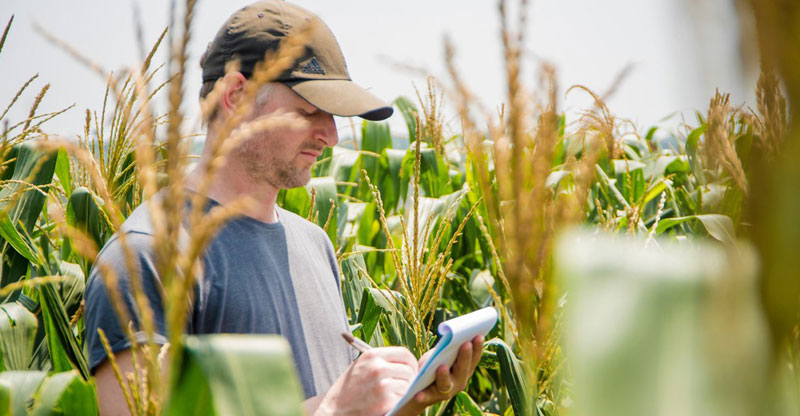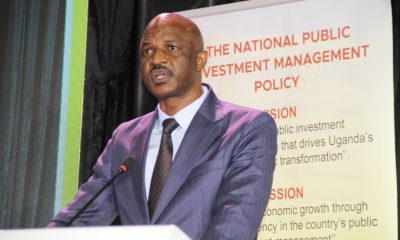human traffickingFeatures
Why GMO’s fiercest critic became its biggest advocate

Mark Lynas taking notes while in one of the GM trials at the National Crops Resources Research Institute (NaCRRI) in Namulonge Uganda, where he said he now shares the frustration of scientists and some farmers arising from delays by Ugandan politicians to allow the adoption of GMO crops to save people from pests and effects of drought. Photo credit: Cornell Alliance
About this time twenty years ago Mark Lynas would be collecting machetes and calling up fellow environmentalists across England to join him to invade and destroy crops on agricultural research stations which they suspected had Genetically Modified (GM) crops.
They were told by seasoned environmentalists from internationally reputed organisations like Green Peace that such crops were dangerous to the environment and to human health. And quite often, they had to put on protective gear as if they were going into an Ebola zone.
Now however, Lynas spends most of his time sharing the same breath with GMOs on trial farms in Uganda, or sharing stories with happy farmers and researchers in some other countries such as Brazil, Canada, Argentina or South Africa where the crops he previously demonised, have had a transformative and positive effect on the lives of people and the economies of those countries.
In an exclusive interview with The Sunrise’s Henry Lutaaya, Lynas revealed he was so ignorant about the technology, even though he managed to lead a campaign that ensured that they destroyed all the GM experiments by scientists that were ongoing in the United Kingdom at the time.
The ongoing resistance to GM technology in Uganda and other parts of the world, in fact could be traced to the work of Mark Lynas, who back then, working as a misguided missile, created a poisonous anti-GM campaign that has obstructed the adoption of a technology to date, despite scientific consensus that shows the technology has more benefits than risks.
Lynas recalls: “I was one of the original people who started the anti-GMO movement. But I was so ignorant about the science. I didn’t even know what DNA stood for. Most of the environmental groups I was working with, said it (GM) technology was dangerous, and I believed them. It turns out it wasn’t true,”
He adds: “I wouldn’t claim personally that our actions were transformative but I was part of the campaign that later became a global movement. But a lot of the concerns or myths and misinformation you hear, we’re the ones who invented them.
Most of the things you hear about Monsanto, about GMOs polluting the environment, we were the ones who invented them. I started the first anti-Monsanto action in England,” Lynas told this writer.
It is a past Lynas deeply regrets and has publicly apologised for starting a campaign that has denied millions if not billions of people access to a technology that can lift them out of poverty.
Perhaps because of his troubling past, and the monumental round-about change he made, Lynas has become one of the key speakers at conferences in which he appeals to policy makers to embrace GM technology.
Lynas’ past also shows that changing one’s ideological view isn’t that easy. For example, from the time he realised the contradiction in his beliefs, which supposedly was around the time he published his first book on climate change titled: Six Degrees; Our Future on a Hotter Planet, published in 2007, he only publicly denounced the anti-GM campaign in early 2013.

Mark Lynas standing in front of improved cassava varieties at the Cassava centre in Namulonge, Wakiso district
While delivering his highly publicized pronouncement at a conference in Oxford, England in Jan 2013, Lynas said: “ I apologize for having spent several years ripping up GM crops l am also sorry that I helped to start the anti-GM movement.”
At the conference, Lynas is quoted as having said: “I had assumed that it (GMOs) would increase the use of chemicals. It turned out that pest-resistant cotton and maize needed less insecticide.
In one of the articles he wrote for the New York Times shortly before he switched, Lynas said: “I am being intellectually incompetent and dishonest by regurgitating information that has no scientific foundation.”
Lynas’s repudiation of the anti-GM movement came at a huge cost to him and his family though, he told me during a media tour of GMO crops still under confined field trial at Namulonge.
Lynas says the technology he so vehemently opposed in the past actually holds solutions to saving the environment such as through reducing the use of pesticides by adopting GM crops that can stand up to invasive pests like the fall army worm.
He has also promoted the technology on grounds that it increases farmers productivity, which helps reduce destruction of forests in search of addition land to cope with increased demand for food.
Why he converted
The turning point for Lynas appears to have been gradual, and came following several interactions with scientists and hours reading scientific data in the course of researching for his book. Six Degrees. Our Future on a Hotter Planet.
Speaking to this reporter during a recent visit to the National Crop Resources Research Institute (NaCRRI), Lynas recollects what triggered his monumental shift.
“What made me turn around was actually discovering science. I almost had a road to Damascus conversion, only that it wasn’t faith-based.
“I was writing books about another scientific topic – climate change and I wanted to be scientifically accurate. I wanted to represent the scientific community faithfully. I spent a lot of time talking to scientists and reading a lot of scientific data. In order to tackle the sceptics about climate change.
I was saying that nearly 98% of scientists say that climate change is real and you must take that. But at the same time, I was saying that nearly all scientists say that GMO food is safe, and I was saying the opposite thing. How could I claim to be standing for science when I was standing in the anti-GM camp which rejected scientific information. That is what forced me to change,” revealed Lynas.
His conversion didn’t come so easily but he suffered pushback and hatred from across the environmental community who looked at him as a betrayal.
“I lost a lot of friends and faced a lot of hostility personally, and for my wife. I am glad that the situation has eased up a bit and that we are winning. A lot of people now realise that we were wrong and they are embracing the technology,” adds Lynas.
Lynas’s revelation could perhaps help to explain why this otherwise potentially transformative technology has faced a lot of opposition in Uganda and other parts of the world. His history indeed reveals that a lot of people are opposed to GM technology because of misinformation but once educated, they find that it’s not as dangerous as earlier thought.
For example, renowned NRM publicist Frank Mulekwa made a similar observation recently when he visited Namulonge agricultural research station and witnessed for himself the potential benefits of GMO crops in overcoming pest and climate huddles.
Mulekwa said after the visit: “A lot has been said about GMOs and we have been made to believe that for sure they are hazardous to our ecological system. Only to realise that that this negative campaign on GMOs is mainly geared and facilitated by wealthy pesticides, seeds and agro-machinery manufacturers who envisage the risk of losing business.
“I realised that the only way to ensure food security and survive for the next 50 years is to advance in biotechnology. Otherwise, with the new resistant plant infections and climate change, our organic food crop species may not survive the test of time,” Lynas recalls.
For Lynas, ever since he made the million-dollar jump, he has not only made new friends, he has found probably an even bigger and less hostile community of scientists, written books and become a regular speaker at conferences where he feels that his views are consistent with evidence.
Currently, Lynas works with the Cornell Alliance for Science, based in the United States, an organisation that seeks to promote the understanding and adoption of scientific solutions that can have positive impacts to humanity.
Comments


























